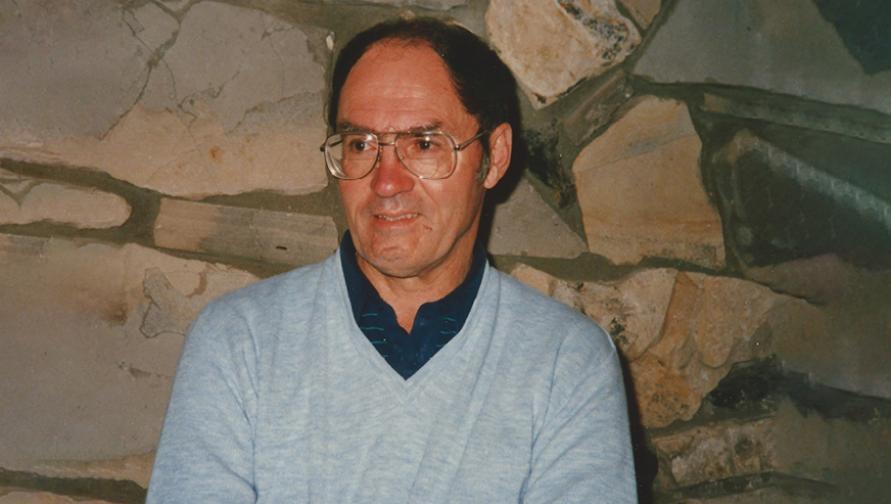
James L. Calderwood, Professor Emeritus of English at the University of California, Irvine, died on February 6, 2020. He was born in Baker, Oregon, in 1930 and attended the University of Oregon, where he played varsity football and basketball and received his B.A. in Psychology. After serving as a Lieutenant in the U.S. Army, Calderwood obtained his Ph.D. in English from the University of Washington in 1963 and then joined the faculties at Michigan State University and later UCLA. He came to UCI in 1966, a year after the university opened. Until he retired in 1994, he served the department and school as a renowned scholar, a widely respected teacher of Shakespeare, and long-time Associate Dean of Graduate Studies; and he continued his athletic career to achieve national ranking in senior men’s tennis.
Ranked among the preeminent Shakespeareans of his generation, Professor Calderwood is the author of many essays and six influential books on Shakespeare’s plays, and editor of four collections of essays on literary genres and criticism with his UCI colleague Harold Toliver. Calderwood is best known for his emphasis on “metadrama,” that self-reflexive dimension of Shakespeare’s language that turns attention to the play and the nature of drama itself. As Calderwood says in Shakespearean Metadrama, Shakespeare’s plays are not just about the various moral, social, and thematic issues they raise, but also about “dramatic art itself—its media of language and theater, its generic forms and conventions, its relationship to truth” (p. 5). Commenting on the impact of this work in 1986, Richard Fly claimed, “The critical sophistication of these books has made [Calderwood] unquestionably the best known and most imitated exponent of Shakespearean self-reflexivity in our time” (p. 132).*
Celebrated for what other reviewers described as an “unpedantic style—lucid and humorous,” Calderwood’s work was perhaps best described by Professor Toliver as “seriously brilliant and nice to read. At UCI he became that best kind of colleague and friend to have at one’s side, one who can see which of several paths is the better one to take. At the time with the Shakespearean[s] that was the one less traveled. If anyone should post a sign on that well trampled path now it would read Calderwood Way.”
*Richard Fly, “The Evolution of Shakespearean Metadrama: Abel, Burckhardt, and Calderwood.” Comparative Drama 20.2 (1986): 124-39. Project MUSE, doi:10.1353/cdr.1986.0053.
Written by professors emeriti of English Harold Toliver and Michael P. Clark.
Ranked among the preeminent Shakespeareans of his generation, Professor Calderwood is the author of many essays and six influential books on Shakespeare’s plays, and editor of four collections of essays on literary genres and criticism with his UCI colleague Harold Toliver. Calderwood is best known for his emphasis on “metadrama,” that self-reflexive dimension of Shakespeare’s language that turns attention to the play and the nature of drama itself. As Calderwood says in Shakespearean Metadrama, Shakespeare’s plays are not just about the various moral, social, and thematic issues they raise, but also about “dramatic art itself—its media of language and theater, its generic forms and conventions, its relationship to truth” (p. 5). Commenting on the impact of this work in 1986, Richard Fly claimed, “The critical sophistication of these books has made [Calderwood] unquestionably the best known and most imitated exponent of Shakespearean self-reflexivity in our time” (p. 132).*
Celebrated for what other reviewers described as an “unpedantic style—lucid and humorous,” Calderwood’s work was perhaps best described by Professor Toliver as “seriously brilliant and nice to read. At UCI he became that best kind of colleague and friend to have at one’s side, one who can see which of several paths is the better one to take. At the time with the Shakespearean[s] that was the one less traveled. If anyone should post a sign on that well trampled path now it would read Calderwood Way.”
*Richard Fly, “The Evolution of Shakespearean Metadrama: Abel, Burckhardt, and Calderwood.” Comparative Drama 20.2 (1986): 124-39. Project MUSE, doi:10.1353/cdr.1986.0053.
Written by professors emeriti of English Harold Toliver and Michael P. Clark.
English
